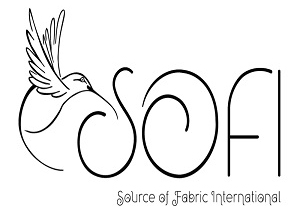When it comes to sourcing materials for your next big project, partnering with wholesale fabric manufacturers can be a game changer. Whether you’re a small business owner, a designer, or a DIY enthusiast, finding the right fabric at the right price is crucial. These manufacturers offer a vast array of options, from luxurious silks to durable cottons, all at competitive rates that can boost your bottom line.
Understanding Wholesale Fabric Manufacturers
Wholesale fabric manufacturers supply large quantities of fabric and textiles to businesses. They focus on production at lower costs, making them essential for small business owners, designers, and DIY enthusiasts who seek affordability without sacrificing quality.
What Are Wholesale Fabric Manufacturers?
Wholesale fabric manufacturers produce textiles in bulk for resale to retailers or end-users. These manufacturers create a wide range of fabrics, such as cotton, polyester, silk, and linen. They operate factories where machines process raw materials into finished goods. By selling directly to businesses instead of consumers, they offer competitive pricing structures. Many manufacturers also provide customization options, allowing businesses to choose colors, patterns, and materials that fit their specific needs. Purchasing from wholesale fabric manufacturers provides an efficient solution for sourcing high-quality materials for various projects.
Benefits of Working with Wholesale Fabric Manufacturers
Partnering with wholesale fabric manufacturers presents several advantages. First, you gain access to competitive pricing. Manufacturers often sell fabric at lower rates compared to retail prices, which enhances your profit margins. Second, the variety of available fabrics supports diverse design choices. Whether you seek cotton for clothing or silk for upholstery, options abound. Third, establishing strong relationships with manufacturers leads to improved service. Frequent communication may result in exclusive offers or priority on new fabrics. Finally, working directly with manufacturers often means quicker turnaround times. High production capacity enables faster delivery, allowing you to meet deadlines effectively. These benefits make wholesale fabric manufacturers invaluable contributors to your business success.
How to Find Wholesale Fabric Manufacturers
Finding reliable wholesale fabric manufacturers involves a few effective strategies. Use these methods to connect with potential suppliers.
Researching Online Directories
Start by accessing online directories that specialize in wholesale suppliers. Websites like Makers Row, Fabric.com, and Alibaba provide extensive lists of manufacturers. Search for specific types of fabrics that meet your requirements. Filter results based on location, minimum order quantities, and product offerings. Review supplier ratings and customer feedback to gauge their reputation. Utilize industry-related forums and social media groups to uncover additional reliable sources. Many experienced professionals share recommendations and insights that can lead you to reputable suppliers.
Attending Trade Shows and Fabric Expos
Participate in trade shows and fabric expos to meet manufacturers face-to-face. Events like the Textile Show and the International Textile Fair showcase numerous fabric suppliers. Before attending, study the event schedule and prepare a list of manufacturers you want to connect with. During the expo, engage with representatives, ask questions about their offerings, and request samples. Collect business cards for follow-ups after the event. Attending these events allows you to gain insights into new trends and products while forming valuable relationships with manufacturers.
Networking with Industry Professionals
Networking with industry professionals can significantly enhance your search for wholesale fabric manufacturers. Join local and online sewing groups, fashion associations, and fabric guilds. Attend workshops, seminars, and meetups to establish connections with other designers, tailors, and fabric buyers. Building relationships with these individuals can provide referrals to reputable manufacturers. Engage on platforms like LinkedIn to expand your professional network. Sharing experiences and asking for recommendations from peers will lead to positive connections within the industry.
Evaluating Wholesale Fabric Manufacturers
Evaluating wholesale fabric manufacturers involves several key factors to ensure you partner with the right suppliers for your needs.
Assessing Quality of Fabrics
Assess fabric quality through several criteria. Inspect samples before making commitments. Look for durability by checking fabric weight and feel. Perform tests for color fastness and shrinkage. This step confirms how the fabric holds up after washing. Understand the fabric types offered. Familiarize yourself with materials like cotton, polyester, and blends. Request detailed product specifications from manufacturers. Ensure that the fabrics meet your standards for design and usage. Evaluate the manufacturer’s reputation on platforms like Yelp and Trustpilot. Consistent positive reviews indicate reliable quality. Consider certifications such as OEKO-TEX or GOTS, which affirm that the fabric adheres to specific environmental and safety standards. Partnering with manufacturers that prioritize quality ensures that you receive products that align with your expectations.
Checking Minimum Order Quantities
Minimum order quantities (MOQs) vary among manufacturers. Verify MOQs to ensure they align with your needs. Some manufacturers might set high MOQs, which may not be feasible for small businesses. Look for suppliers that offer flexible quantities, allowing you to test new fabrics without excessive commitment. Compare MOQs between different suppliers. This comparison helps in identifying manufacturers that cater to small projects. Negotiate MOQs if necessary, especially for repeat orders or larger fabric selections. Establish clear communication regarding order sizes upfront to avoid surprises during the purchasing process. Choose manufacturers that demonstrate understanding and flexibility towards your order requirements for a fruitful partnership.
Understanding Pricing Structures
Understand the pricing structures of potential manufacturers to ensure transparency. Evaluate base prices per yard or meter, knowing that these might vary based on fabric type and order volume. Inquire about bulk pricing discounts, which could provide significant savings for larger purchases. Ask about additional costs, such as shipping, handling, and taxes, to determine the total investment required. Compare pricing across several manufacturers to find the best balance between cost and quality. Look for hidden fees or conditions tied to pricing. Establish relationships with manufacturers for potential future negotiations on prices. Understanding the complete pricing structure aids in budgeting for your projects effectively.
Making Wholesale Purchases
Wholesale purchases require careful planning and clear communication with manufacturers. This process ensures efficient sourcing of fabrics while maximizing cost-effectiveness.
Preparing Your Order
Preparation plays a crucial role in wholesale fabric purchasing. Start by determining the specific fabrics needed for your projects. Assess requirements such as fabric type, color, texture, and quantity based on your project demands. Create a detailed list outlining each item and its specifications.
Next, review manufacturer catalogs to align your needs with available options. Understanding the minimum order quantities (MOQs) assists in formulating your order, ensuring that you meet supplier requirements while avoiding excessive inventory. Check for any customization options offered by manufacturers to match your vision.
Finally, conduct a thorough quality check to ensure you are satisfied with your chosen fabrics. This process includes requesting samples from manufacturers to evaluate texture, color, and durability. By being precise in your preparation, you set the foundation for successful wholesale purchases.
Communicating Effectively with Manufacturers
Effective communication enhances the purchasing process with wholesale fabric manufacturers. Begin by reaching out via email or through their official contact forms. Clearly introduce yourself and your business, outlining your interest in specific fabrics and their details.
Articulate your requirements clearly, including quantities, colors, and fabric types. Ask specific questions regarding pricing, delivery timelines, and any customization options available. Ensure to mention delivery locations and any required lead times for your project.
Maintain a documented record of all communications. This practice assists in avoiding misunderstandings and provides a clear reference for future discussions. Prompt follow-ups after initial contact can reinforce your commitment and establish rapport. By prioritizing clear communication, you foster positive relationships with manufacturers.
Finalizing Payment and Shipping Arrangements
Finalizing payment and shipping arrangements is a pivotal step in the wholesale purchasing process. Confirm the total cost of your order, including any taxes, fees, and shipping charges. Request a detailed invoice before proceeding with payment to ensure clarity on all costs involved.
Choose a payment method that suits both you and the manufacturer. Common options include bank transfers and credit card payments, with many providers accepting secure online transactions. Verify that payment terms align with your budget and cash flow.
Next, discuss shipping preferences with the manufacturer. Determine the most convenient shipping method based on your timeline and budget. Ensure clarity on delivery dates and tracking options, allowing for follow-up if needed. Making these arrangements effectively enhances the efficiency of your wholesale fabric purchasing experience.
Organizing Sampling and Production
Organizing sampling and production involves systematic steps that ensure quality outcomes when sourcing fabrics from wholesale manufacturers.
Requesting Fabric Samples
Requesting fabric samples represents a critical step in the procurement process. Samples provide insight into fabric quality, colors, and feel, helping you make informed decisions. Follow these steps to streamline your sample requests:
- Identify Fabrics: Pinpoint specific fabrics of interest based on your project needs. Use manufacturer catalogs for guidance.
- Contact Manufacturers: Reach out to chosen manufacturers via email or website forms. Clearly state your interest in fabric samples.
- Specify Quantities: Indicate the number of samples required. Keeping it reasonable often encourages manufacturers to send samples without hesitation.
- Provide Details: Outline additional needed information, such as intended use and desired colors. This clarity helps manufacturers fulfill your request efficiently.
- Follow Up: If you do not receive a response within a week, follow up courteously. Maintaining communication shows professionalism and eagerness.
By methodically requesting fabric samples, you gain firsthand experience, which allows for better choices in your projects.
Discussing Custom Orders
Discussing custom orders plays a significant role in working with wholesale fabric manufacturers. Custom orders cater to unique design specifications and quantities. Use the following steps to enhance custom order discussions:
- Outline Your Needs: Clearly define your custom fabric requirements. Include aspects like fabric type, weight, color, and any special treatments.
- Set Minimums: Check the manufacturer’s minimum order quantities (MOQs). Understanding this aspect avoids surprises and facilitates negotiation.
- Ask About Lead Times: Discuss expected production timelines. Knowing lead times assists in project scheduling and helps manage expectations.
- Negotiate Pricing: Be open about budget constraints. Manufacturers often provide bulk pricing options or discounts for large orders.
- Request Production Samples: Before committing to a full order, ask for a production sample. This step ensures the final product meets your standards.
Effectively discussing custom orders equips you with a clear path toward obtaining the specific fabrics required for your projects.
Troubleshooting Common Issues
Every business faces challenges when working with wholesale fabric manufacturers. Addressing these issues early on helps maintain strong supplier relationships and ensures project success.
Quality Control Problems
Quality Control Problems often arise, impacting your fabric orders. Inspect samples before placing bulk orders. Conduct checks for defects in fabric such as holes, uneven dye, and inconsistencies in texture. If issues are present in the samples, reject the batch before production begins. Request a specific quality assurance process from manufacturers. A detailed specification ensures they understand your quality expectations. Maintain clear records of communications regarding quality concerns. If defects occur in received fabric, document them and immediately contact your manufacturer to discuss the problem. Manufacturers may offer replacements or credits. Effective communication helps resolve these quality issues quickly, protecting both your investment and your project timeline.
Delayed Shipments
Delayed Shipments can disrupt project timelines and affect business operations. Track your orders and shipment statuses regularly to avoid surprises. When an order is placed, confirm shipping dates and methods. If deadlines approach and fabrics have not arrived, contact the supplier for updates. Document all communications for reference. In cases where delays happen, negotiate expedited shipping options if necessary. Have backup plans in place, such as alternative suppliers or fabrics, to minimize impacts on your projects. If shipping delays become a pattern, consider reevaluating your relationship with that supplier. Reliable manufacturers consistently meet deadlines to ensure smooth operations.
Miscommunication with Manufacturers
Miscommunication with Manufacturers can lead to costly errors. Clearly state your requirements and expectations during initial discussions. Provide detailed specifications such as fabric types, colors, and measurements. If language barriers exist, use simple language and confirm understanding through summaries. Be proactive in reviewing order confirmations to ensure accuracy. If discrepancies arise in received fabrics, address them immediately with the manufacturer. Document each point of discussion for future reference. Establishing a consistent communication channel helps decrease the chances of misunderstandings and builds a stronger partnership with your manufacturer. Regular check-ins also allow you to address concerns before they escalate.
Tips for Building Long-Term Relationships
Building strong and lasting relationships with wholesale fabric manufacturers relies on trust and effective communication. Focus on these strategies for better partnerships.
Establishing Trust and Reliability
Establishing trust with wholesale fabric manufacturers enhances collaboration and leads to favorable outcomes. Share your business goals clearly to align expectations. Be transparent about your needs and timelines, providing accurate orders to foster reliability. Honor commitments such as payment deadlines and quantity agreements. Consistent interactions build confidence, allowing for predictable dealings. Request references from manufacturers to verify their reputation for quality and consistency. Attend trade shows to meet representatives face-to-face, cultivating rapport that promotes long-term cooperation. Regularly express appreciation for their services to reinforce positive relations. This approach not only sustains engagement but also encourages suppliers to prioritize your orders over others, improving the overall partnership experience.
Regular Communication Practices
Effective communication fosters strong partnerships with wholesale fabric manufacturers. Schedule routine check-ins via calls or emails to discuss ongoing projects and raise concerns. Utilize communication tools such as video calls and messaging apps for quick updates and clarifications. Share project timelines and material needs upfront to avoid misunderstandings. Document all interactions, including agreed deadlines and changes, to maintain clear records for future reference. Respond promptly to inquiries from manufacturers to demonstrate commitment. Provide constructive feedback on samples and orders received to improve quality and service continuously. Maintain an open dialogue to adapt to potential challenges and opportunities in your business relationship, ensuring lasting cooperation and success.
Conclusion
Partnering with wholesale fabric manufacturers can significantly impact your business’s success. By accessing a wide variety of high-quality fabrics at competitive prices, you can enhance your offerings and boost profit margins. Building strong relationships with your suppliers is crucial for ensuring smooth operations and reliable service.
Remember to communicate clearly and establish trust to navigate any challenges that may arise. With the right strategies in place, you can create a solid foundation for long-term collaboration. Embrace the opportunities that come with working alongside wholesale fabric manufacturers, and watch your creative projects flourish.
Frequently Asked Questions
What are the benefits of partnering with wholesale fabric manufacturers?
Partnering with wholesale fabric manufacturers allows small business owners and designers to access large quantities of materials at competitive prices. This leads to better profit margins, a diverse selection of fabrics, quicker turnaround times, and improved relationships with suppliers, all while maintaining high quality.
How can I find reliable wholesale fabric manufacturers?
You can find reliable wholesale fabric manufacturers by exploring online directories like Makers Row, Fabric.com, and Alibaba. Additionally, attending trade shows and networking with industry professionals can provide valuable referrals and insights.
What should I evaluate when choosing a wholesale fabric manufacturer?
When selecting a manufacturer, assess the fabric quality, understand minimum order quantities (MOQs), and clarify the pricing structure. This ensures transparency and helps you make informed decisions while sourcing materials.
How do I manage the wholesale purchasing process effectively?
Effective management of the wholesale purchasing process involves careful planning and clear communication. Prepare your orders meticulously, request fabric samples, and finalize payment and shipping arrangements to avoid misunderstandings and delays.
What are common challenges when working with wholesale fabric manufacturers?
Common challenges include quality control issues, delayed shipments, and miscommunication. To mitigate these problems, inspect samples thoroughly, track your orders closely, and set clear requirements to maintain strong supplier relationships.
How can I build long-term relationships with fabric manufacturers?
To build long-term relationships, focus on trust and effective communication. Share your business goals, be transparent about your needs, and honor your commitments. Regular check-ins and prompt responses will also enhance cooperation and success.


